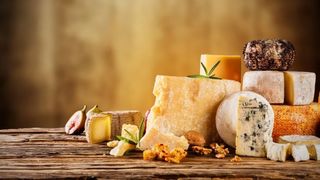Is Cheese Good For You?
We’ll keep this brie-f: in moderation, sure

Legend has it that an Arabian merchant discovered cheese by storing milk in a container made from a sheep’s stomach for a journey across the desert. The heat of the desert caused the milk to react with the rennet in the stomach and separate into curds and whey. The merchant, clearly a brave and enterprising soul, tried the curds and found them delightful. Thus cheese was brought into the world.
Since that quite possibly apocryphal moment, cheese has firmly established itself as a favourite foodstuff in almost every corner of the planet. The reason for that popularity is simple: cheese tastes delicious. The incredible variety of cheeses available means there’s at least one type that will delight almost everyone, from the stinkiest blue to the mildest square of plastic-wrapped burger cheese. Aside from vegans, the lactose intolerant and anyone else who has a similarly strong reason to steer clear of cheese, most of us will find a type we want to eat morning, noon and night. On crackers, ideally.
So whatever the answer to the question “is cheese good for you” is, it’s clear that cheese is here to stay. But is cheese healthy? We crossed our fingers and asked dietitian Aisling Pigott of the British Dietetic Association that exact question.
We’ll start with the good news.
What are the health benefits of cheese?
“It’s delicious,” says Pigott, who knows what people want to hear. However, cheese’s benefits go beyond its excellent flavour.
“It’s a great source of protein and calcium, and it’s low in lactose, so it’s an ideal source of calcium for those who are struggling to digest lactose – for example if they have transient lactose intolerance.”
That cheese is laden with calcium won’t be news to many of you, but you might not know just how loaded with protein certain kinds are. Check out our ranking of high-protein foods, which has parmesan at number two with 32g per 100g, edam at seven with 27g and cheddar at nine with 25g.
Get the Coach Newsletter
Sign up for workout ideas, training advice, reviews of the latest gear and more.
What are the downsides of cheese?
“Cheese is high in fat, particularly saturated fat,” says Pigott. “It’s energy-dense and easy to overeat.”
Ain’t that the truth? We reckon there are very few foods that are as moreish as cheese, but if you can somehow keep your portion sizes the right side of respectable then your cheese intake won’t carry your daily calorie count well beyond the recommended amount. Beyond the high amounts of fat, there’s not many other downsides when it comes to cheese, though it’s also a good idea to check that the salt content of your chosen cheese isn’t pushing you past the recommended daily intake. Also, if you’re someone with an increased risk of listeria food poisoning – if you have a weakened immune system, for example – then it’s wise to steer clear of blue cheese.
See related
Are there any types of cheese that are healthier than others?
You could live a hundred lifetimes and still not try every cheese that exists, and there is a large variety in the nutritional make-up of different cheeses. So, if you’re worried about the amount of calories in your cheese, you have options.
“There are low-fat cheeses available, but as with many low-fat products, if the taste isn't up to scratch, it can leave us feeling dissatisfied,” says Pigott.
“Some cheese – like feta – is slightly lower in energy, and its strong flavour means it can go a long way.’
Opting for strong flavours in general can help you satisfy any cheese cravings without over-indulging, but naturally this will only work in certain situations.
“Generally I suggest strong flavours to people, like parmesan and mature cheeses, ensuring they can use less but enjoy the same taste,” says Pigott.
“But like everything it’s about what’s appropriate – there is no point putting feta on a cottage pie. That would taste strange…”

Nick Harris-Fry is a journalist who has been covering health and fitness since 2015. Nick is an avid runner, covering 70-110km a week, which gives him ample opportunity to test a wide range of running shoes and running gear. He is also the chief tester for fitness trackers and running watches, treadmills and exercise bikes, and workout headphones.
